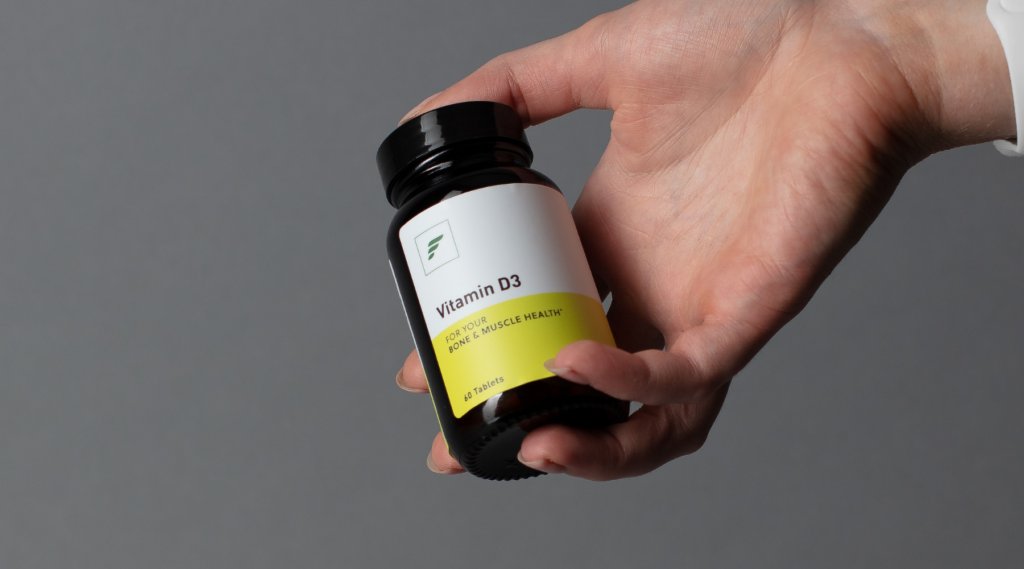

Why do we need vitamin D?
Vitamin D is a fat-soluble vitamin. It promotes the absorption of calcium and phosphorus from our diets, making it essential for maintaining bone and muscle health (1, 2). Vitamin D also contributes to the normal functioning of the immune system and our inflammatory response mechanisms (3).
Low levels of vitamin D are associated with a higher risk of poor musculoskeletal health such as rickets, osteomalacia, falls and poor muscle strength (1).
Signs of a vitamin D deficiency are feeling fatigued, bone pain, muscle weakness or aches/cramps, anxiety and depression.
Food sources of vitamin D.
Aside from sunlight, vitamin D can be found in a small number of foods:
- oily fish
- red meat
- liver
- egg yolks
- fortified foods
What is the Nutrient Reference Value of vitamin D?
- EU NRV 5mcg/day or 100 IU
- UK NRV 10 mcg/day or 400 IU (4,5)
For who do we recommend a supplement?
Vitamin D, the “Sunshine vitamin”, is a vitamin we mainly get via sunlight exposure on our skin. Data from a PHE National Diet and Nutrition Survey shows that 23% have low levels of vitamin D, and are at risk for developing a deficiency. Many of us aren’t getting enough vitamin D from diet and sunlight alone, and for this reason, a supplement can be recommended.
A supplement is advised for everyone, particularly during autumn and winter: October – March in the UK (4, 5). Those with a darker skin pigment or people whose skin has little or no exposure to the sun should consider taking a supplement all year round. People over 60 years old should also consider taking a supplement, as the cells in your skin make less vitamin D from sunlight as you get older (2, 3).
FFF Supplement Dose.
50 mcg or 2000 IU for adults.
Not all researchers agree with the current NRV value, as serum vitamin D levels might still not be sufficient for all (>30 ng/mL or 75 nmol/L) (6). The Endocrine Society recommends an intake between 1500 IU to 2000 UI for adults (7).
Why choose supplements from Fresh Fitness Food?
There are two forms of vitamin D, namely vitamin D3 and vitamin D2. Vitamin D3 is better absorbed and utilised by the body. Traditionally vitamin D3 is derived from animal-based sources like lanolin (sheep’s wool) and fish oil. Our vitamin D is derived from lichen, a symbiosis between fungi and algae, which makes it an animal-free, sustainable and eco-friendly source.
When it comes to our health, the food we put in our bodies can have a significant impact in many ways. It affects our mood, energy levels, stress, physical activity and everything in between. The right nutrition can help us to feel better, every day. At Fresh Fitness Food we believe in a food-first approach as food provides you with so much more than just nutrients. Many of us should be able to get most nutrients from a healthy and balanced diet, however, there are some caveats and exceptions where food supplements can assist to fill up the gaps.
If you are unsure or have any questions about food supplements, you can book in for a call with one of our all-knowing nutritionists here (link: https://meetings.hubspot.com/fffcall/supplements-consultation).
Or, order today and start smashing your goals with personalised nutrition!
Get £50 off a 5-day trial with code: BLOG50. Start your trial here
References:
- Adams, J. and Hewison, M., 2008. Unexpected actions of vitamin D: new perspectives on the regulation of innate and adaptive immunity. Nature Clinical Practice Endocrinology & Metabolism, 4(2), pp.80-90.
- Cranney, A., Horsley, T., O’Donnell, S., Weiler, H., Puil, L., Ooi, D., Atkinson, A., Ward, L., Moher, D., Hanley, D., Fang, M., Yazdi, F., Garritty, C., Sampson, M., Barrowman, N., Tsertsvadze, A. and Mamaladze, V., 2007. Effectiveness and safety of vitamin D in relation to bone health. Evidence report/technology Assessment. Full Report, 158, pp.1–235.
- Meehan, M. and Penckofer, S., 2014. The Role of Vitamin D in the Aging Adult. Journal of Aging and Gerontology, 2(2), pp.60-71.
- GOV.UK. 2021. PHE publishes new advice on vitamin D. [online] Available at: <https://www.gov.uk/government/news/phe-publishes-new-advice-on-vitamin-d> [Accessed 15 June 2021].
- GOV.UK. 2021. SACN vitamin D and health report. [online] Available at: <https://www.gov.uk/government/publications/sacn-vitamin-d-and-health-report> [Accessed 15 June 2021].
- Sadat-Ali, M., Al-Anii, F., Al-Turki, H., AlBadran, A. and AlShammari, S., 2018. Maintenance Dose of Vitamin D: How Much Is Enough?. Journal of Bone Metabolism, 25(3), p.161.
- Holick, M., Binkley, N., Bischoff-Ferrari, H., Gordon, C., Hanley, D., Heaney, R., Murad, M. and Weaver, C., 2011. Evaluation, Treatment, and Prevention of Vitamin D Deficiency: an Endocrine Society Clinical Practice Guideline. The Journal of Clinical Endocrinology & Metabolism, 96(7), pp.1911-1930.